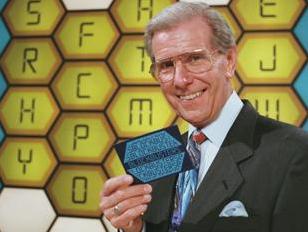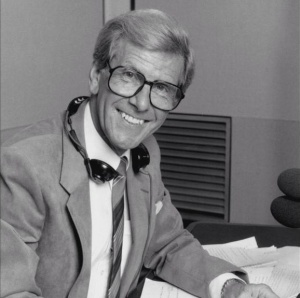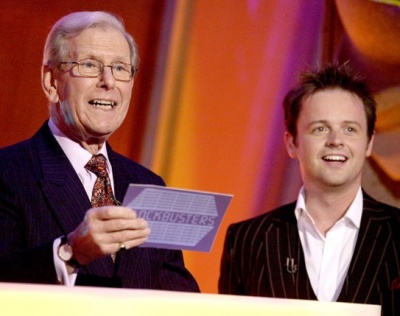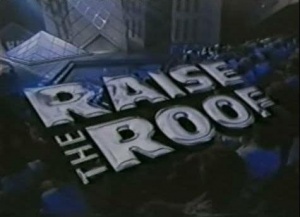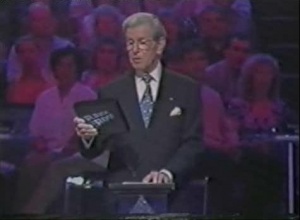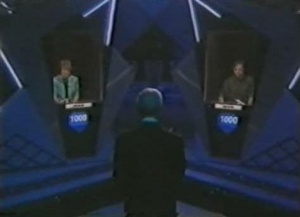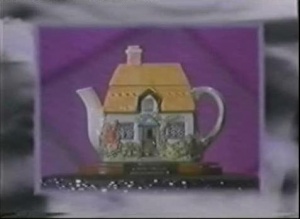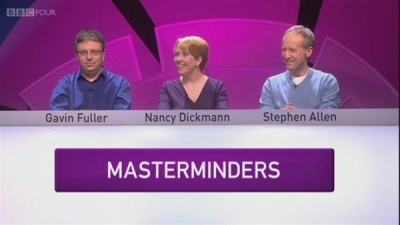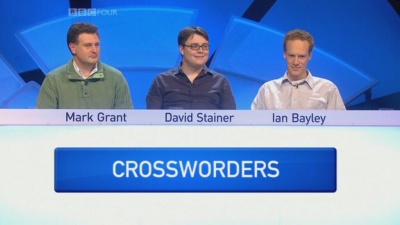Weaver's Week 2012-01-15
Last week | Weaver's Week Index | Next week
Contents |
Bob Holness
"What A was Bob Holness?"
Unfailingly polite, always sympathetic, and gently encouraging to anyone and everyone. Throughout his career, Bob Holness sought knowledge, to test the boundaries and perhaps to expand them.
Bob is best remembered for Blockbusters (1983-95), a show where sixth-form students sought prizes that would broaden their minds. For the best winners, there would be two foreign trips and three prizes of practical use – learning a skill, or some equipment for their passions. Even for those who didn't make the gold run, there was a handful of cash, but also the Blockbusters sweatshirt and dictionary, and the memorable experience of appearing on network television.
Though Bob always said that the contestants were the stars of the show, it wouldn't have lasted a decade without him. He was interested in the activities of the contestants, though never quite seemed to understand them. He would recognise the quiet snigger – or obvious embarrassment – in the voices of contestants asking, "Can I have a P please" or "I want U, Bob". He recalled in an interview in 2006:
- "People say 'Don’t you ever get fed up with it?' but I didn't. I loved everything to do with the show so it always got a very positive reception from me, however many times I heard it!"
Born in Natal, South Africa, in 1928, the Holness family moved to Britain when he was young, and was educated at Ashford Grammar School during the war. The young Bob would cycle along the lanes, picking up shrapnel from bombs and downed aircraft, before returning home to listen to the Armed Forces Network. He attended Maidstone College of Art, and took employment as a printer's apprentice in South Africa. There, he met his future wife Mary, and acted on the stage and radio, where he was one of the first to play James Bond.
- "I was doing lots of radio plays at the time but I wanted to do something a bit different so when James Bond came up I ventured in and said yes. I had never even heard of him at the time but it became an amazing part to play and the response from listeners was terrific!"
Returning to the UK in 1961, Holness was contracted by Granada Television in Manchester. There, he was a newsreader and continuity announcer, and hosted Take a Letter and Junior Criss Cross Quiz. These were spectacularly popular programmes, back in the days when there were just two television channels to choose from, and no-one watched the BBC. A million entries came in for some of the puzzles on Take a Letter, which ran for two and a half years.
"What L did Bob Holness wake up every morning for ten years?"
Holness moved to London in the mid-1960s, where he took a variety of roles. He was reporter and interviewer for World in Action and the Today television programme. On radio, he hosted Workers' Playtime, Housewives' Choice, and the quiz show Top of the Form. He spent eight years on Late Night Extra, one of the BBC's first unscripted entertainment programmes. Yes, there was a time when even Chris Evans had to have all his "spontaneous" asides written out two weeks in advance and approved by a BBC functionary. On Late Night Extra, Holness would interview anyone who came into the door, or could be reached on the end of a telephone, whether Spike Milligan or the doorman at the Dorchester.
For ten years, Bob worked with Douglas Cameron on LBC's morning programme AM, setting the benchmark for quality and accessible journalism on British radio. This was news radio, presented in an entertaining style that Radio 4's Today programme never matched, and retaining top-mark journalistic integrity. Bob's natural curiosity and affable manner teased out the story, in a way that more brusque reporters could never quite replicate. He could do light and shade, gravitas and light-heartedness in one show, even in one item. Holness and Cameron were named the Independent Radio Personality in both 1979 and 1984.
After leaving LBC in 1985, Holness presented programmes for Radio 2 – Bob Holness Requests the Pleasure, which later morphed into Bob Holness & Friends; and the poetry-and-music programme Anything Goes on the World Service.
"What BS features a saxophone solo from Raphael Ravenscroft?"
One thing Holness never did was perform the saxophone riff on "Baker Street"*. Gerry Rafferty's top ten hit featured the lungs of Raphael Ravenscroft. The myth about Holness can be traced to an article in the NME's back pages circa 1990, when staff writer Stuart Maconie would fill a column with ludicrous untruths, perhaps hoping that one or two of them would be taken seriously.
Blockbusters remains Bob's crowning achievement – with all due respect to his successors Michael Aspel and Liza Tarbuck, it's always going to be Bob's show. It wasn't his only high-profile quizzing engagement – Holness was selected to host ITV's great new hope of autumn 1995, Raise the Roof, which we review below. Later, he would chair a revival of Call My Bluff, introducing Sandi Toksvig to a wider audience.
Holness suffered a number of minor strokes in the early part of last decade, and we were saddened to see his frailty when he appeared with Ant and Dec for a Saturday Night Takeaway skit in 2004. But we were more than pleased to see that he was still the charming gentleman, and that this was a dream fulfilled for the hosts. Bob Holness is survived by his wife and three children.
Raise the Roof
Action Time and Yorkshire co-production for ITV, September – November 1995
We need to put this show in historical context. The UK national lottery had launched in November 1994, and had quickly become a national obsession. It wasn't so much the television draw show – which has always been dull – but the sense that people would get insanely rich by watching the BBC. The leading commercial channel wasn't going to put up with this, and hunted around for a format that would allow them to give away as much as they could. Prize inflation hit hard – Catchphrase had increased its jackpot from "a nice foreign holiday" and £700 to "a trip around the world" and £1000. Lucky Numbers gave away £20,000 most weeks, but ITV thought the route to success was to dangle increasingly large carrots in front of their readers. The hope was to force the BBC into niche formats, ones that tested specialist knowledge, such as Mastermind, or ones that were mainly an entertainment with the prize an incidental extra.
So it was that the great ITV hope – and great ITV hype – of autumn 1995 was Raise the Roof. Announced at the beginning of the year, and trailed through the baking summer as the show where someone could win the house of their dreams, the programme was put out around 8.15 on Saturday nights. It's a little after the Lottery had failed to deliver millions, opposite the Beeb's ratings banker Casualty, and after ITV's own established hits Gladiators and Blind Date.
Now, this column saw most of the series when it went out, but hadn't seen any episodes again until one appeared on the interwebs this week, and our thanks to Buzzerblog for bringing it to a wider audience. The first thing we'd forgotten: for a flagship show, it's only 30 minutes long. These days, we're so used to ITV stretching out programmes like chewing gum on a scheduler's fingers: an hour for the most quotidian daytime show, 65 minutes for The Colour of Money, almost four hours for some editions of The X Factor. We'd completely lost a time when ITV allowed programmes to be the length they should be.
The introductions were remarkable, too – the six contenders were sat at cafe tables, with family and/or friends, and a spotlight zooming in on the contender. Announcer Charles Foster describes this as "the show that opens the door to television's biggest ever prize", and will shortly give a glowing description of tonight's house. Bob tells us the amount the producers paid for the house, then six podia slide into play. The contenders stand behind them. None of them have spoken yet.
Here's another thing we'd completely forgotten: Bob was fed the questions on a tablet computer. Producer Arch Dyson wanted the show to have something extra. "We've given it dramatic thwack-in-the-gob visuals: the opening graphics are like something out of Terminator 2; the set is like something from the West End theatre; the lighting is like a rock gig. So file cards? We thought, no, we'll move forward with that too." The theme music by Mike Woolmans was neo-classical, as was the fashion at that time, and the graphics had a motif of liquid mercury flowing. It was modern, it was futuristic, it had a roof that raised to reveal Bob. But the computer touchpad thingummy was smoke and mirrors – wireless technology was not sufficiently advanced to reliably pump questions to the host, and he would generally use the tablet to conceal a common-or-garden question card.
Round one was Lucky Seven, a series of seven true-or-false questions. Each was worth, in order, £50 – 55 – 60 – 70 – 80 – 85 – £100, for a maximum total of £500. However, should a contestant give an incorrect answer, they would "zero out", and lose all the money won so far. We knew this as the Wipeout Scoring System, and here's the first time it was slightly abused, as the questions seemed to get easier as the round went on. The three highest scores won through to the second round, and typically that needed at least the last four questions right.
Into round two, Bid and Break, where each player is spotted £500, and allowed to stake up to £100 on some general knowledge questions. When they make their opening bids, almost seven minutes into the show, it's the first time we hear the players speak. Players win their bids if they give a correct answer, but lose it from their stash if they don't. The top two players progress, so there's a trivial winning strategy: bid the minimum £1 on every question. The lowest score takes whatever's left from their £500, plus whatever they won in the first round. All the losers get Bob's Bungalow, a teapot in the shape of a bungalow.
And here's another thing we'd completely forgotten: games played in complete silence. During the question rounds, the only thing to be heard is Bob asking the questions, and the occasional answers from the contenders. These days, everything would have music behind it. As, indeed, does much of the action in the head-to-head final, Head to Head.
Prefaced by a handshake between both players, they're put into isolation booths, and given £1000. Bob adopts his stern, no-nonsense face, one that says it's not the moment to ask for a P, and this is the reason why it's Bob Holness: he can do frivolous, and he can do serious, and he can move between the two in a heartbeat. The players are allowed to stake up to £200 on each question, and enter their bids by typing on a keypad. The questions, they're answered in the normal way, by speaking into a microphone. There's sweat, there's perhaps some blood – producer Arch Dyson didn't allow the make-up crew near the set in this part – but no tears make the edit. The loser leaves with the money from all three rounds, which could easily reach £2500.
The obvious problem with Raise the Roof was that the questions weren't actually all that difficult. "Which Frank Sinatra song was also a hit for the Sex Pistols?", a sample from the head-to-head, "How many stripes are there on the US flag" from the grand final. In theory, players could reach the final with just one correct answer, at the end of the Lucky Seven; in practice, players would usually score on a dozen of the the seventeen questions asked so far.
Things didn't get much tougher in the final, where the contestant picked five subjects from a range of about fifty, and had to get four of them correct within a minute's thinking time. It's almost as if they wanted to give away the house – then valued at £92,000, now probably closer to £350,000. Losing contenders would take the money they'd won in the main quiz and a consolation prize, such as a leather sofa. Winners won the house, quite literally.
The fundamental problem was that the contestants were completely interchangeable. They didn't open their mouths until round two, they were barely allowed to speak outside of the quiz. While continual sob stories and plans for the money are distracting, Raise the Roof gave the viewer too little involvement. Who are these people? Why should we care?
Showing its usual commitment to accuracy and balanced comment, that other wiki describes Raise the Roof as "unsuccessful". This is opinion masquerading as fact. While it wasn't the massive hit ITV hoped it would be, Raise the Roof made it both possible and acceptable to give away massive prizes, trumpeting that some of the winners took a (notional) six-figure sum. It provided evidence that British viewers expect their big winners to really work for their money; answering a score of very moderate questions wasn't going to produce a "deserving" winner. And it proved that a big prize wasn't enough on its own, the programme had to be entertaining in its own right. Without the successes and failures of Raise the Roof, shows like Millionaire could never have succeeded, and we can see here reasons why Red or Black failed to catch fire.
One thing was right from Raise the Roof's producers: it pushed the BBC away from big prizes. Only shows associated with the Lottery Corp. are allowed to give away huge prizes, and even on The People's Quiz and Who Dares Wins, people have really got to work for their rich rewards.
University Challenge
Group phase, match 3: Worcester Oxford v Newcastle
Worcester Oxford had a narrow win over The Queen's College Oxford, Newcastle won a Hallowe'en horror show against Birmingham. Thumper tells us that the eight-into-four system was devised by http://plato.stanford.edu/entries/wittgenstein/ Wittgenstein]'s grand-daughter.
It's definitions to start with, but Newcastle demonstrate they don't know much about the Tamworth manifesto. Deaths according to fits of laughter tests whether they were watching Only Connect back at the start of the series, and didn't themselves keel over while watching Ian Hislop trying to work out Billy Corgan's claim to fame. Bureaucratese provides Newcastle with a minimalist markage incrementation (five points), and Worcester get going with some questions on pressure. They also get the first visual round, on the ranges of musical instruments, and have reduced the gap to 45-30.
And it falls further, with questions on Russian writers giving Worcester a lead, the captain wisely nominating a team-member to give one name that she didn't quite hear. Newcastle re-take the lead with the term "user-friendly", but fail to convert questions on the architecture of Trafalgar Square. They're not asked about the person who dropped the star from the top of the Christmas tree a few years ago, and was voted off Dancing on Ice last night.
"Your bonuses are on punning book titles", and three million viewers groan. The audio round is on classical music about the sea, but no-one knows the composer's Debussey, and Newcastle's lead stands at 75-65. No, Mr. Metzer, the last piece isn't asking for the composer's Handel. Worcester take the lead with the next starter, only to be overtaken by Newcastle's detailed knowledge of the Nine Circles of Hell. Or, as they doubtless know it, Sunderland.
Newcastle are in straits, scoring one on a set of bonuses about these geographic features. Both sides are converting precisely one-third of their bonuses at this stage, and that's really not good enough for this phase of the contest. The second visual round is on figures blacked out of paintings, no-one knows St Peter is the man in black, and Newcastle's lead has reached 125-90. Eye-eye, Worcester score with a set of bonuses on words containing "ii", but know nothing about Checkov and remain five points adrift.
The Oxford side does know its meteor showers, enough to give them the lead at the five minute warning. Pictures in "The Rake's Progress" give Worcester a set of bonuses on acids, only for Newcastle to pull back with Aubergine of the Week. They don't do too well on roads called the A1, and Worcester pick up the starter and run down the clock on questions about sorrow in Shakespeare. The next starter puts the match beyond doubt, even without the geographical cakes.
A tight game, which Worcester won by 190-150. By no means a classic, not one set of bonuses was completely correct, but neither was there a missignal. Worcester were correct in 26/51 questions, Newcastle in 20/53.
Next match: Clare Cambridge v Homerton Cambridge
Only Connect
Masterminders v Crossworders
As highlighted in the "What to Watch" section of ... the Metro newspaper? Really? Strange days.
The Crossworders are the undefeated reigning champions, and champions of champions, and champions of champions of champions of Only Connect, and captain David Stainer reflects on his narrow win last week. The Masterminders are Gavin Fuller (champion in 1993), Stephen Allen (1991), and Nancy Dickmann. Lest we forget, Ian Bayley of the Crossworders is the reigning Mastermind champion, but finished second in the 2009 series, losing by a whisker to ... Nancy Dickmann.
Game on! The Masterminders begin with an audio round, hear two clues, and get something from "Death in Venice" and "La Serenissima", so it's Venice and three points! That's more than the Crossworders got in the whole of this round last week! For the Crossworders, some meaningful phrases. "Over all of Spain, the sky is clear" and "Climb Mount Niitaka". Famed military codes, there, and a grisly but well-earned point.
Adder and Possum and Squire. "Could be something about the words" mutters Nancy. Nottingham appears, she offers Robin Hood. It's worth a guess, but Possum Joe? No, it's words that lost their initial letter – as Ian explains, the snake was originally "a nadder", and the city Snottingham. Things that were ___ of the Century give two for the Crossworders.
Now trailing, the Masterminders find Quentin Crisp next to Mahmoud Ahmadinejad. As one does, rather putting the kybosh on one contestant's assertion that they're all notorious homosexuals. Apart from the president of Iran, that is. How do they link to the parents of Stephen Lawrence and Marge Simpson? What? Erm. No offer from the Masterminders, and "Blue" is the Crossworders' answer, based purely on Marge Simpson's hair. Blue is not your colour; they've all presented Channel 4's "Alternative Christmas Message". Obviously. Pictures for the Crossworders: some actress, Slobodan Milosevic, a map of Liberia, and Lt. Uhura. "Freedom" is the link: the actress was Saoirse Rohan, and the Crossworders are free to lead 5-3.
Sequences loom. ?! is followed by !? and !. Will the very large question mark be replaced by a single question mark? No, it's the wisdom of chess moves, so !! is next, and a bonus to the Crossworders. Kairouan is followed by al-Quds, so obviously it's Mecca last, being holiest cities in Islam.
Gawds, Victoria's giving encouragement to the Masterminders, who have approximations of pi: 355/13, 333/106, 22/7, but these approximations are getting increasingly approximate, not increasingly accurate, allowing the Crossworders to step in for one bonus. If 1982 Peru and 1992 Egypt, the teams are thinking about the succession and country of origin of UN secretaries-general. Mr. Ban came to office in 2007, and he's from South Korea, and that's three points. And an excuse for David Stainer to say "Boutros-Boutros Ghali" on national television, about which he's well chuffed.
Onwards. The Hirsel. Is that all the Masterminders are going to see? It is! "Grantham" is their offer, which isn't allowed. "Grantham and Kesteven" is from the Crossworders, and that's not taken. It's Kesteven alone, being the name taken by former British prime ministers elevated to the peerage (so skipping Ted Heath). There's tension in Victoria's voice, and Gavin Fuller looks particularly annoyed. Could just be us, of course. Law terms are in the picture round, two more for the Crossworders, who now lead 16-3.
Onto the walls, where the Crossworders find themselves looking at a flag day, and then at metropolitan boroughs. Is there a set of people called Anne? No, but there is a set of FTSE 100 chief executives. Sporting terms, butterflies all flit into view and then out again. David Stainer can't remember what he's pressed before, but does manage to get the wall out first time. Awards from the AA for quality is the next group, and shapes of flag means it's a perfect wall. Ten points!
Wall 157 is the last playalong one for the series, and it's a good start, with Masters of the Monarch's music and girls' magazines coming out quickly. Then they stop with three parts of a group found while they try to work out what the other one is. Cats seems to be the line of attack, but it's not happening. A set of characters in "Ed Reardon's Week" evades the team, as does a group of UNIX shell commands. Four points!
All to play for in the missing vowels round, with the Crossworders defending a 25-7 lead. Only about twice as large as the lead they just about defended last week. This week, the regular Only Connect music has been replaced by "Approaching menace", the Mastemind theme. Types of glass goes to the Crossworders 2-0, but Occasions when the National Anthem is played goes to the Masterminders 3-0. The fightback starts here! And ends here, famous signoffs goes to the Crossworders 2-0.
Which means the Crossworders are the winners, by 29-10. "There's no shame in losing to the Crossworders," says Victoria. Everyone loses to the Crossworders!
Only Connect's taking a few weeks off, there's a second Connecting Walls tournament on 30 January, and a Sport Relief special to air.
This Week And Next
We regret to chronicle the death of Richard Hopkins, aged 47. A respected entertainment producer, he worked on The Big Breakfast, The 11 O'Clock Show, Big Brother, the UK version of Fear Factor, and Fame Academy. He revived Mastermind, and created its Junior and Celebrity editions. He'll be best remembered as the driving force behind Strictly Come Dancing, piloting the show through the BBC development cycle, and producing the finished series both here and in the States. Hopkins went on to create Fever Media, responsible for shows including Dancing on Wheels, The People's Quiz, and Move Like Michael Jackson.
We also regret to chronicle a typo from the Labour press office. In a week when messages had been shorn of context, and the press had got into a tizzy over race, the present leader's office regretted the death of Bob Holness, and remembered his work on "Blackbusters". This isn't the thing to publish at 2.45 on a Friday afternoon, when office staff are champing at the bit for the weekend, because they'll wind down with a round of Ed Miliband Game Shows. Some of the highlights included "One Man and his Gaffe" (contributed by MartyPG13), "Tweet the Nation" and "Pointless" (many contributors). Others made reference to the defeated leadership candidate David Miliband: "Celebrity Big Brother" crossed our radar a lot, David Jones MP offered "Family Misfortunes", and Rayfield Exports submitted "Call My Bruv". Rob D Waller came up with "Who Wants to be a Miliband?", and both Don Foster MP and celebrity lookalike Sue Perkins suggested "I'm Sorry I Haven't a Clue". Was the latter a not very well concealed job application? We do hope so.
While down with the 'flu early in the week, we caught Celebrity Wedding Planner with celebrity haircuts Jedward. Just the right sort of intellectual challenge for when we're feeling terribly icky. Major bonus points to whoever picked the incidental music, cutting to the first advert break with a tune called "Hellraisers".
Another week, another OFCOM report. This one spends ages in deciding that two competitors on Four Weddings weren't unfairly treated; our reading is that they didn't like the edit and the fact they came last. We hope the couple have put this behind them and will have a long and happy life together. Voting in the Big Brother final received 64 complaints, but there's nothing to answer. Countdown attracted five complaints, I'm a Celebrity 35 moans. The winner of Most Obscure Thing Someone's Complained to OFCOM About: Ceefax page 109. Sixty people objected to the voting in The X Factor final, and sixteen to offensive language in the show. Can people not say G*** B***** before the watershed?
Ratings in that awkward week between Christmas and New Year show Celebrity Mastermind top of the tree, with 5.8m viewers on Thursday. The Big Fat Quiz of the Year recorded 3.9m, ahead of Paddy's 2011 Show and Telly on 3.6m. Christmas University Challenge finished with 2.45m, and the final of World's Strongest Man on Channel 5 was seen by 1.6m people. That's actually ahead of Celebrity Juice (a disappointing 1.55m); The Satellite Channel's Got to Dance had 985,000 viewers.
This week, Masterchef's back, and scheduling doesn't get simpler than BBC1, 9pm Tues-Thu. New series of Coach Trip and Come Dine with Me on Channel 4 daytimes (from 5pm), the return of Pop Idle Us (ITV2, from 9pm Thursday), The Write Stuff (Radio 4, 11.30 Friday), and Room 101 becomes a game show (BBC1, 8.30 Friday). Two new shows in Ireland: An G Team (TG4, 8pm Sunday), and Who Knows Ireland Best? (RTE1, 8.30 Friday).
Links marked with a * help support the UKGameshows servers.
To have Weaver's Week emailed to you on publication day, receive our exclusive TV roundup of the game shows in the week ahead, and chat to other ukgameshows.com readers, sign up to our Yahoo! Group.

